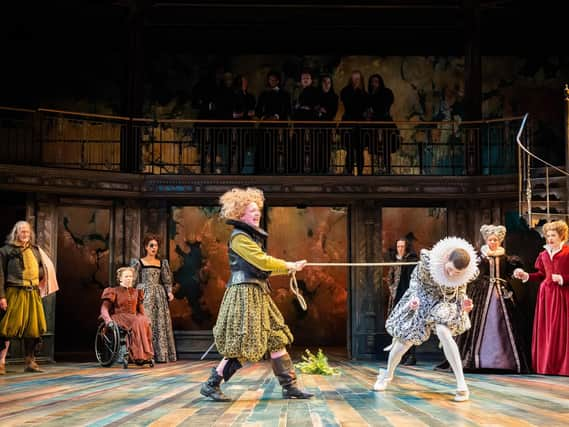REVIEW: The RSC's gender-switched Taming of the Shrew is richly rewarding


Sometimes, one big idea works better than many small ones. And that is certainly the case with this production of Shakespeare's uneasy comedy of exploitation and control.
In its original form, The Taming of the Shrew tells of a man's successful attempts to subdue and essentially break his sharp-tongued, strong-willed wife. He does so by abusing her physically and psychologically; to repeat, this is a comedy. The play has been regarded as morally questionable for centuries, but seems to jar especially in these times. What then can the RSC do with it?
Advertisement
Hide AdAdvertisement
Hide AdThe answer is simple yet profound. In Justin Audibert's production, all the gender roles are switched - with society being run by women, for women, while men are typically regarded as objects and possessions. This having been established from the outset, the play is then let to run in a pleasingly clear, uncluttered manner, with little gimmickry or titivation. The experience is rather like watching a scientific experiment, only with better clothes and more laughs. And it works.


The RSC has benefited in recent years from an array of especially talented female actors, who often have a tendency to outshine their male counterparts. The gender switch plays perfectly to their strengths: Sophie Stanton is plainly capable of carrying a production on her own and here excels as a vain, haughty and prissily imperious Gremia; Emily Johnstone is a lovably libidinous Lucentia; Amanda Harris is icily commanding as Baptista. These are big, bold, fun performances, which themselves justify the show's break with tradition. And they are ably assisted by countless others, including Leamington's Amelia Donkor as a charming Hortensia, the ever compelling Charlotte Arrowsmith as Curtis and Amy Trigg's delightfully sharp turn as Biondella
And it is perhaps thanks to them that Claire Price has room to explore the darkest extremes of Petruchia. Her portrayal grows ever more twisted and chilling as she snares her prey and embarks on her monstrous regime. There is no attempt to play this for laughs: the humiliation of Katherine, played by Joseph Arkley, is quite harrowing to witness, as he is starved, made to think himself mad (this being centuries before Gaslight) and reduced to a state of brokenness and bedragglement. Petruchia is in love with nothing but her power. And Arkley plays his part with great skill, maintaining a dignity that is heartbreaking.
There is a sense throughout of a play being given space to breathe. There is nothing didactic, clumsy or heavy-handed, and no single interpretation forced upon the audience. There are moments of tremendous entertainment, with Ruth Chan's music fusing disparate styles in a joyful fashion, and flamboyant song-and-dance routines executed adroitly. Hannah Clarke's costume design, meanwhile, is undoubtedly one of the production's greatest triumphs: it is rare these days to see traditional dress at the RSC (which has become rather besotted with hoodies of late), and its dramatic potential is fulfilled beautifully here. The radiant colours are done great justice by Matt Peel's lighting, too, which is also impressively cold when proceedings turn more bleak.
Advertisement
Hide AdAdvertisement
Hide AdSome deep-rooted difficulties remain, however. The ending, in which the 'taming' is celebrated and the shrew submits, feels as unjust and unsatisfying as ever; here, it appears in slight danger of appearing as a celebration of female power, which sits rather uneasily, although it is intriguing to hear Katherine's final speech spoken by a man, "our bodies soft and weak and smooth" and all. And finishing with an upbeat dance number, while ensuring the audiences leaves with a smile, provokes a certain emotional queasiness.


Yet to its credit, this production asks many questions but rarely provides definitive answers. It prompts us to ponder how we consider violence perpetrated by women upon men; it calls us to question manifold social assumptions that still hold today; it leads us to contemplate what true equality may be. It is broad and deep and bright and dark and treats the audience with respect. And here, in its unflinching depiction of gender-based power, the play finds a fresh potency.
* The Taming of the Shrew runs until August 31. Visit rsc.org.uk or call 01789 331111 to book.